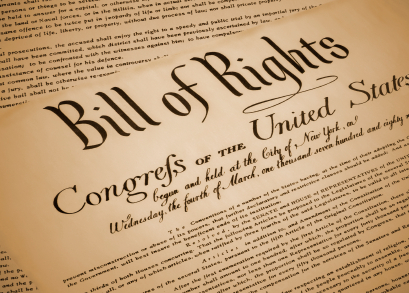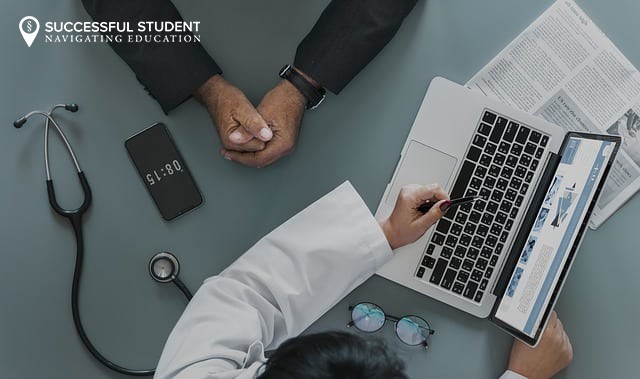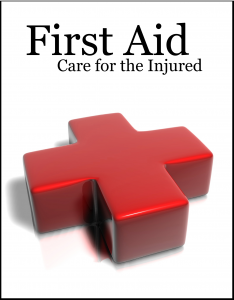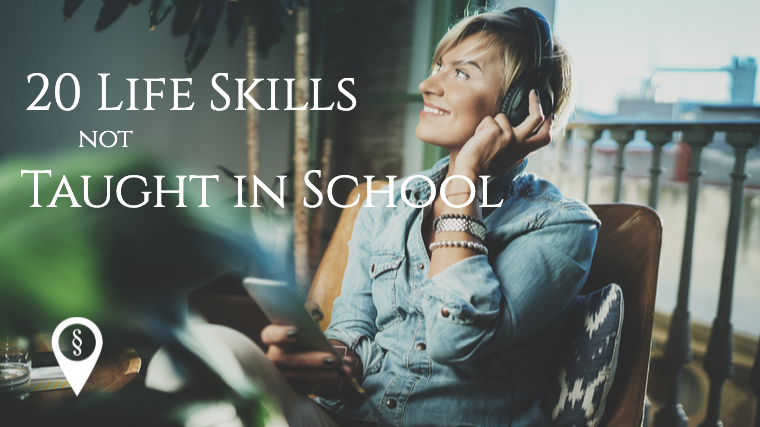20 Life Skills Not Taught in School
- Social Skills
- Thinking
- How to Handle Money
- Dating and Relationships
- Personal Rights
- Using Analog Technology
- Home Repair & Homeowner's Insurance
- Car Repair & Car Insurance
- Personal Credit & Credit Cards
- Cooking
- The Bible
- Manners
- Gun Safety
- How to Find and Get a Job
- Health Insurance
- Self-Defense
- Learning From Failure
- First Aid
- Time Management
- Local Law
This article has compiled 20 Life Skills Not Taught In School, and which are valuable skills in life. In some respects some of these life skills are essential in life.
An education should involve teaching life skills that a person will carry with them after college in order to navigate the demands of life.
Though high school and college are excellent in teaching many valuable skills, our current academic curriculum doesn't teach important life skills that is many aspects necessary to succeeding and thriving in life.
These skills include critical thinking, financial responsibilities and investments, decision making and problem solving, and how to apply them to real-world scenarios. And some of these essential skills that we can develop are the most important life skills that we use in our everyday life.
It's still the job of parents to develop in their child or children skills, strategies, and how to use resources in dealing with contemporary issues as their child grows up. The ability of an adolescent to focus, control emotions, especially in the face of challenges, are skills that parents should stress in the development of their children.
Furthermore, higher education doesn't spend much time teaching students how to be self-employed.
Featured Online Colleges:
Online college is growing in popularity, with a majority of students taking at least one online class. Leading online colleges such as Grand Canyon University are also adding more and more degree subjects, such as Science, Film, and Social Media, to their available online degrees.
20 Life Skills Not Taught in School
1. Social Skills, like Talking in Person

Social skills, such as the ability to hold meaningful conversations, are essential life skills required in almost all interactions with others, whether personal or professional. Communicating well with coworkers, bosses, loved ones, dates, friends, spouses, neighbors, acquaintances, etc., enable human beings to accomplish their goals and thrive, from personal to societal levels.
Healthy communication requires certain social norms and boundaries to be observed. These skills in our connections include mutual respect and give-and-take—whether it's face to face, by email, social media, telephone, or any other means of communication.
The problem is that social skills aren't being developed given the pervasiveness of communicating through technology.
The younger generation has been called the silent generation, given that they communicate mostly in this way, which often does not require actually speaking to anyone, such as texting, social media messages, email, images, etc.
Related:
In communicating in this non-personal manner, their interpersonal skills are being hindered. In this realm of communication in-person socialization helps stop social developmental disabilities in interpersonal relationships. This is especially important in the domain of kids life skills.
Children learn connections, such as how to give and take and read the social cues of other kids in ways that can't be expressed through technology. Research shows a correlation across time between the lack of a sense of well being and difficulty regulating negative emotions as social media and phones were developed and proliferated starting in the 2010s to the present.
The outcome could be social isolation and mental health problems. Lacking this life skill could stifle a person in various ways, and potentially become a barrier to rewarding careers and the full enjoyment of relationships.
Knowing how to connect with others, being empathetic, when to speak and when to listen, is of great value in the workplace and in healthy relationships. To learn the art of conversation is to actually do it, with peers and other people in their community. This also helps with writing skills.
More resources:
- The 20 Best Online Degrees To Get For Careers
- The Best Online Humanities Degrees for Careers
- The Best Degrees and Jobs for Generation Z
- The Best STEM Degrees for Careers of the Future
- What's the Difference Between a College and University?
2. Thinking

The stakes are high in our duties and responsibilities in life. The decisions we make have real-world consequences, some immediate, and some delayed, affecting ourselves and others. Making the right choices could literally mean the difference between happiness and remorse, success and failure, and so on.
We need to be equipped with the ability to think through scenarios and situations which inevitably arise in our lives, not only for the sake of successful endeavors, but also for the sake of being wise for its own sake.
Students are never taught how best to learn. Many educators seem to expect students to know how to best understand what they're being taught.
In being taught the skills of self awareness and self control, students learn decision making and problem solving in creating new solutions. This fosters engaged learning and can lead to self awareness and development in skills such as writing and numeracy skills.
In short, being taught how to think and develop ideas is a skill that has lifetime benefits.
See our article the 7 Characteristic of Successful Students

Educators test students on specific things, and as such students will learn the specific things just for the tests, and often by rote memorization. Rote memorization isn't meaningful. What's been memorized hasn't been integrated into a person's overall understanding and ideas.
Often students are not taught how to think through to solutions; even in math, formulas are memorized and the numbers plugged-in to the formula without an understanding of the formula's formation, what it is solving for exactly, and what real scenarios it's applicable to.
3. How to Handle Money and Investments

The importance of financial responsibly is obvious. Accounting, finance, and business classes do explain accounting procedures, financing arrangements, and business structures, but do not focus much on personal finances, saving or investing. The job of these classes is to prepare students for working environments, and not necessarily for managing their own finances.
Popular financial personality Dave Ramsey's advice for getting out of debt is a good place to start.
For the self-starter, knowledge of how to set up their financial affairs, manage their finances, pay taxes, and reinvest into their investment vehicles is crucial, and can mean the difference between failure and success.
4. Dating and Romantic Relationships

"If a thing is worth doing, it is worth doing badly" said G. K. Chesterton. With some things we will be awkward and fumble when we are first doing them. Dating is one of those things. But it's worth doing, so it's okay if it's done badly at first, and we can learn and grow from our experiences. Schooling doesn't help our awkward dating life because it doesn't have any curriculum in this domain of life.
Nevertheless, we can all agree that this aspect of life is very valuable, for this is the first step in falling in love, getting married, and starting a family--and the family is the foundation of society. It is, therefore, important to choose the right mate, know what to look for and what to avoid in a partner, and how to be a good partner yourself. This takes practice and attention to yourself and your date.
As with conversation, this experience comes by doing. However, some guidance from our peers and our teachers could help avoid common pitfalls and mistakes that are bound to occur in dating and relationships.
5. Personal Rights

In certain classes we are taught the Bill of Rights, but how these broad rights actually apply to us in day-to-day practice is usually not covered. It is important as a citizen to know and practice your rights when appropriate, and enjoy the freedoms that the U.S. has to offer.
It is also beneficial to be involved in politics, from the federal to the local levels, and be aware of who the politicians are, such as the senators representing your state and the mayor of your city. Also, bills that either do or do not pass congress, or that are put to a vote, have an affect on us as citizens.
6. Using Analog Technology

With the popularity of smart phones and e-readers, mechanical watches and books are becoming rarer. Can you read a single-hand watch, such as the one in the picture? The watch in the picture shows the time as 7:09. One revolution around the whole watch takes 12 hours.
It takes one hour to move from the 1 to the 2, an hour to move from the 2 to the 3, and so on. Each individual marker (between the numbers) represents a 5 minute increment.
So if the hand is at two marks past the 10, it is 10:10. At three marks past the 10, it is 10:15, and so on. The first pocket watches were made with only one hand. While this is now antique and appears unique, it is beneficial to know how to read modern analog clocks. Watches that are "automatic" will never need a battery and will last hundreds of years if taken care of.
One benefit to reading paper books is that older books can still be read, which are usually not in any e-reader form. They can be borrowed, traded, and gifted. They don't need to be charged. They can be signed and annotated. There are no updates needed, or platform or filetype incompatibilities.
I fear that the popularity of e-readers will mean that old books will cease to be produced (or read, by extension), which will mean that we will be cut-off from the knowledge and history of much of antiquity, which will mean the first generation in history which will exist as an island, annexed from the wisdom of history and tradition, except for the most popular that can be monetized and sold. The books that are converted into digital form are chosen by their potential profit.
"If current demand is low, will digitization attract enough new viewers to justify the cost?"
Columbia University Libraries
7. Home Repair and Home Owner's Insurance

As a home owner, potentially costly repairs and replacements to the home will inevitably be necessary, and knowing how to do them can save homeowners in costly repairs.
Painting, plumbing, carpentry, electrical work, etc., are all involved in maintaining and repairing a home, and since home is where most of your valuables are and where you will spend most of your life, knowing how to do repairs and improvements is always valuable.
Home owner's insurance will cover some costly repairs to the home. It's important to be aware of what types of damages and what amounts are covered and included in the policy.
Knowing what tools are necessary for specific repair jobs makes the work much easier. Learn how to read a ruler and tape measure and be able to take accurate measurements.
One of the easiest and most striking ways of improving a house is a fresh coat of paint. Also, maintaining the yard and flower beds add lots of curb appeal. All of this taken together contributes to the value of your home, both monetarily and intrinsically.
8. Vehicle Maintenance, Repair, and Insurance

Much of the same about repairing and maintaining your home applies to repairing and maintaining your automobile. Regular maintenance can cost less on repair bills, such as changing the oil every so many miles. Also, changing the oil and oil filter yourself is an additional way to save.
Maintaining proper air pressure in the tires helps gas mileage to go farther, and knowing how to change a tire can mean the difference between being stuck on the side of the road or a momentary setback.
Repairs and maintenance are inevitable for anyone who drives a vehicle for any reasonable length of time, and as such it would be helpful if these skills were taught to students, given that quite literally almost everyone will encounter such issues.
Also, knowing which vehicle to buy and which to avoid, based on their performance and safety ratings, and which holds the most resale value, are good things to know.
It's important to have full coverage insurance on your vehicle, to cover it and other vehicles in the event of an accident. With accidents, whether they're your fault or someone else's, comes filing a claim with car insurance.
Knowing what your coverage consists of is important, such as what your deductible is for having your own car repaired, and what dollar amount your insurance will pay for fixing another person's car if the accident was your fault.
9. Personal Credit and Credit Cards

Establishing and maintaining good credit is one of the most valuable life skills.
We all start with no credit, which is not bad, but it's not necessarily helpful to lenders, and thus good credit needs to be established. Getting a credit card, such as Discover, Capital One, or Fidelity is a good start (retail cards at department stores like Macy's don't help as much for improving credit).
Do not "max out" the credit card by using more than 90% of the credit limit, and do not miss payments and always pay on time. It's important to steadily build your credit in this way, so that more and more credit can be extended.
Avoid many credit inquiries by financial institutions, as many inquiries can reflect negatively on your credit report. Get a copy of your credit report each year for free, and be aware of what's on it.
The three major credit bureaus are Equifax, TransUnion, and Experian, and all three will have credit reports on you. Keeping good credit will mean having lower or no interest rates when financing a car or house, and will cost less over the length of the note.
One way of getting your first credit card without any established credit is to get a secured credit card. The way of getting a secured credit card is to deposit in the bank a certain amount into a checking account that you cannot withdraw from, and then they extend the same amount of credit to you. Making the payments is how you're developing credit.
The credit is secured; because you've made the deposit the to the bank, they can take it if you use the credit and don't repay it. For example, you can give the bank $300 and they can give you a credit card with $300 in credit. If you miss a payment, the bank will take the payment amount from your account to cover the missed payment.
Once credit is established in this way over time, a bank may feel more comfortable extending more credit or credit that isn't secured and won't require a deposit from you.
10. Cooking

Being taught how to cook and how to handle household duties as life skills are gone with the era of taking Home Economics classes. Nevertheless, cooking is essential to life and very beneficial to eating healthy, and therefore being healthy. With home cooking, the ingredients and dishes can be controlled, and the portions commensurate with one's appetite.
Cooking at home generally saves times and expenses over eating at restaurants. Culinary school is a specific education that comes after graduating. However, the basics of cooking, food pretreating and preparation, safety and hygiene, should be taught to all students as basic curriculum.
11. The Bible

The Bible is not covered in public education due to the separation of church and state. However, in teaching what the Bible says as an education in history, literature, ethics, etc., doesn't mean state endorsement of it as a religious position.
The Bible is the greatest selling book in the history of the world, and in certain households the only exposure some students will have to the Bible would be in education.
Given the influence of the Bible into western culture and its impact throughout the world, to be denied and potentially remain ignorant of the Bible would be to impoverish students to a well rounded, thorough education in its own right.
Learning what the Bible contains will put people in touch with what the majority of humanity has also learned for the past two thousand years, regardless of one's beliefs.
12. Manners

Manners are indispensable in civilized society, and using them properly will make good impressions with family, our significant others, in-laws, friends, teachers, bosses, acquaintances, etc. As etiquette classes are a thing of the past, likewise manners have steadily been on the decline.
However, an etiquette class shouldn't be required to know to say please and thank you, sir and miss. Also, the more genteel the society one keeps the more important manners will become.
Along with manners should be extended kindness and respect for all people encountered in normal society, and notice how proper manners always achieve this end.
Additionally, as one travels abroad, it is important to learn the customs and manners of that society, so as to not cause offense, and to get along as well as possible. Learning the manners of a society shows, like signposts, the values and traditions that a society holds dear.
13. Gun Safety

Gun safety is increasingly important given the sheer volume of guns in our society. Children who aren't taught the dangers of guns are more susceptible to the injuries they can cause.
With the onslaught of gun violence, especially in schools, guns are not allowed on campus by anyone except law enforcement, or other trained and qualified personnel.
And for good reason. Nevertheless, learning gun safety and proper gun handling is important to learn. Such training instills adequate respect for the power of guns, reduces the likelihood of a gun-related accident, and demystifies guns and shooting, thus reducing the stigma surrounding guns.
This right to gun ownership is ensured by the 2nd amendment of the United States Constitution. In teaching students about guns, schools would be enabling American citizens to exercise one of their Constitutional rights, and decreasing gun related accidents.
14. How to Find and Get a Job

How to find and get a job is a one of the most crucial life skills. The goal of education is primarily twofold: to educate for its own intrinsic reward of being knowledgeable about existence, and secondly to prepare students to engage the workforce and become self sufficient, productive, contributing members of society.
As such, finding a job is crucial to the latter and, of course, for the sake of supporting oneself and family.
Students would benefit from being taught how to successfully go about finding a job, applying for a job, building a resume and cover letter, the interview process, and understanding and negotiating employment contracts.
There could be mock interviews in which students go through a simulated interview process, learn what is beneficial and detrimental to their particular interview, and each student benefits from the process.
Also, going through the process of looking for and practicing for getting a job takes the insecurity out of the process. It demystifies it.
15. Health Insurance

Students need to be taught at least the basic rudimentary facts about getting and maintaining health insurance, which can be a confusing process to an expensive and ever-changing system.
Schools should keep up with the changes to healthcare and inform their students accordingly. Not every healthcare situation can be covered in class, however, certain broad-stroke generalities about the law and the policy holder's rights can be taught, which cut across all aspects and differing healthcare providers.
How to shop for the best care at the best price, the difference between individual and group plans, the difference between vision and dental care, and how the premiums are affected by each particular of the plan, can be a great starting point for students to make informed decisions about their healthcare.
16. Self Defense

We all have the right to self defense as a basic right, afforded to us by virtue of being alive. It can be the job of educators to prepare students for adult life in the real world in general, and it is a reality that self-defense can be necessary in protecting the wellbeing of yourself and your loved ones.
Hopefully, no one would ever need to use self-defense, but in the event that using skills learned in self defense classes was ever necessary, exercising those skills could mean preservation of life and limb. It is better to know how to defend oneself and never need to, rather than to need to, and not know how.
Having pepper spray, mace, a concealed weapon, is a good start to self defense preparedness. However, there could be scenarios in which these are inaccessible, and old fashioned hand-to-hand combat and defense becomes necessary. For women it is particularly advisable to know the weaknesses of a man, and how to apply maneuvers accordingly that would leave any potential violator incapacitated.
17. Learning from Failure

Learning from failure is one of the essential life skills. Creating fortitude and durability in the face of challenges and defeat in students is one of the essential life skills. Education research shows that students have different abilities at different times throughout their development. The only way to explore student abilities is to try and succeed or try and fail in different ways.
There is a modern trend towards equality and egalitarianism, in academia and in children's sports. The life skill of how to deal effectively with failure properly is often being avoided to avoid student stress.
It is an increasing practice of academia and sports to preserve every students sense of self confidence, and as a result students are not being told that their work is substandard and worthy of a failing grade. Or, by contrast, that their work is substantially better than their classmates.
Along this thinking many team sports have stopped taking scores so that there can be no winners or losers. However, there is no such atmosphere in general society that is sympathetic and concerned with an individual's sense of self esteem, and in the real world substandard work results in negative consequences, such as losing one's job.
This practice has a tendency to make students mediocre, and fearful of taking risks. Learning from failure teaches tenacity, gumption, character, and makes one tougher and more capable of navigating life's inevitable ups and downs.
18. First Aid

Along with the need for learning how to navigate healthcare for yourself and family, also important is knowing how to give first aid help, such as cardiopulmonary resuscitation, when necessary. Accidents can happen at just about any time, and being equipped with the skills of first responders is important.
In extreme events, this skill could mean the difference between life and death. Often times the response time of medical professionals is too long, and can result in complications and worsening symptoms, which could be preventable by immediate help from a close individual.
Looking for appropriate warning signs for things like a concussion, frostbite, heat exhaustion, dehydration, not breathing, etc., would be very valuable skills.
Knowing how to apply CPR, clean and dress a wound, prevent infection, apply the Heimlich maneuver, apply a tourniquet, are just a few of the important aspects that could be taught to students, and have very beneficial, life and limb saving consequences.
19. Time Management

While assignments, tests, papers, exams, and so on are expected by educators to be studied for and taken in certain time constraints by students, educators don't really teach the students how to manage their time effectively. Time efficiency is not only helpful, it is increasingly valuable the older we get, for the older we get the less and less time we will have.
It becomes especially important as we try to navigate our career and raising of children. Schedules will become increasingly important in these regards. Sleep becomes less and less required for productivity the older we get.
Calendars and alerts on our smart phones are services make keeping schedules much easier. There are many good time management apps which can be downloaded on our smart phones for this purpose.
20. Local Law

Knowing the law is one of the most pragmatic skills. Ignorance of the law will not keep a lawbreaker out of out of the criminal justice system if the law has been demonstrated to have been broken in the judicial system.
Students should be taught, at bare minimum, the laws that might have an effect on their lives before they graduate and enter society as adults. For example, is trespassing a misdemeanor or a felony? Could decorating a friend's car be considered destruction of property?
Can someone be arrested for not paying a debt, such as a credit card? What rights does someone have who has just been arrested? Given the real-life and potential consequences of breaking the law, developing the skill to understanding the law should be taught to students.
